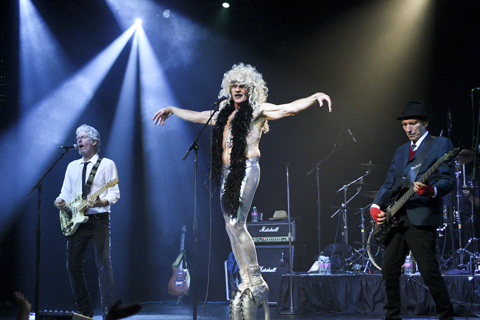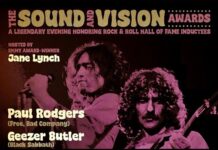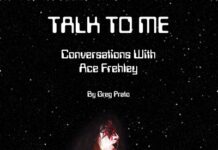Photo Courtesy of John Staley Photography
The Tubes
What Do You Want From Live
On their second album, they sang about the glories of being “young and rich,” but by 1977, the fortunes of The Tubes were anything but secure.
Three albums into their tenure with A&M Records, the noted nonet – driven by theatricality and primo musical showmanship — was still seeking out its big break. Though the band’s wholly unique combination of dance, costume, Rocky Horror-worthy personas (Google “Quay Lewd”), and raucous rock n’ roll drew throngs to see them live, they still couldn’t conquer the charts in the States.
“We had no success whatsoever, nothing,” Tubes frontman Fee Waybill recalled to me recently. “We didn’t have any hits. We had a management team that were ex-cab drivers…We had no success, pretty much at all.”
Novel and over-the-top in terms of stage execution and song composition, I was drawn to the band during my college years, marveling at how tracks titled “White Punks on Dope,” “Mondo Bondage” and “Don’t Touch Me There” were pressed onto vinyl yet sounded like extensions of Phil Spector’s Wall of Sound. They managed to score a personal triumph by getting legendary outsider artist Captain Beefheart to cameo on their third album, Now. They even snagged Kenny Ortega as a choreographer well before his name became synonymous with Michael Jackson. What went wrong?
“From the beginning, we always did better touring than we did selling records because we had a big show,” Waybill said. “I don’t think we ever thought ‘make it or break it.’ We were so gung ho, so art for art’s sake. We were making art. We didn’t give a shit. I know we never made any money, but we weren’t paying attention. We were doing our thing.”
Like KISS, a live album would ultimately be the charm for the band. Yet while the studded and make-up wearing quartet would rely on musical bombast at Detroit’s Cobo Hall to help them go platinum in 1975, The Tubes would harken to another part of the globe and another world-famous venue — the Hammersmith Odeon in London — for their shot at musical glory.
As Waybill admits, The Tubes’ fourth album, 1977’s What Do You Want From Live, wouldn’t have even occurred without initial faith and support from the group’s new manager, Rikki Farr of Isle of Wight festival fame. “He said, ‘You guys gotta go to Europe right now. You got to go to the UK; they’ll love this shit!’ So, we did,” Waybill told me. “He was the one who started it all, and that was the first success we really had when we played Hammersmith Odeon. We were really big zeroes in the states. Playing Hammersmith and London changed things for us.”

Though the band didn’t sell out all their shows, a week’s worth of performances would comprise the album, complete with song medleys, band standards and a game show-driven atmosphere. The UK audiences gladly ate it up despite musical tastes at the time being eaten alive by punk rock.
While the group’s stage antics and performance art sound like a breeze upon listening to the album, their show embodied all elements of the Great White Way.
“We worked so hard every night — get up the next day and we’d rehearse before the show, ironing out little things that went wrong the night before like a Broadway production,” Waybill said. “Kenny Ortega was a genius. I mean it was insane. We were a well-oiled machine, I tell you.”
“It was a freak show. It never stopped,” the singer added. “We didn’t wait for audience applause. It was one thing into the next thing and the next thing. It was ridiculous.”
It was also what the band needed to stay viable on their home turf and with their record label. Sadly, they wouldn’t become superstars as a result of this album’s release. However, it would lead to Todd Rundgren producing their fourth studio album, Remote Control, in 1979 before the band dove headfirst into new wave. They would ultimately reach the Billboard Top 10 in 1983 with “She’s a Beauty,” complete with a carnival-style music video that seemed tailor-made for MTV.
The band continues to tour despite several original members being long departed from the group, including lone female member Re Styles. More than 40 years later, the UK still makes the cut on the band’s tour itineraries, Waybill said, adding the band recently opened shows for Alice Cooper in Manchester and at Hammersmith.
Harkening back to the band’s first experiences in the UK, I asked Waybill why the Hammersmith audiences were driven into such a fervor over the band’s songs and look. He offered the following:
“It was our satirizing ourselves, our taking the piss — as they say in England — which means making fun. We were making fun of our society and they loved it; they fucking loved it. That was their comedy. We were the Monty Python of rock and roll.”
***
Share your feedback and suggestions for future columns with Ira at vinylconfessions84@gmail.com.




















